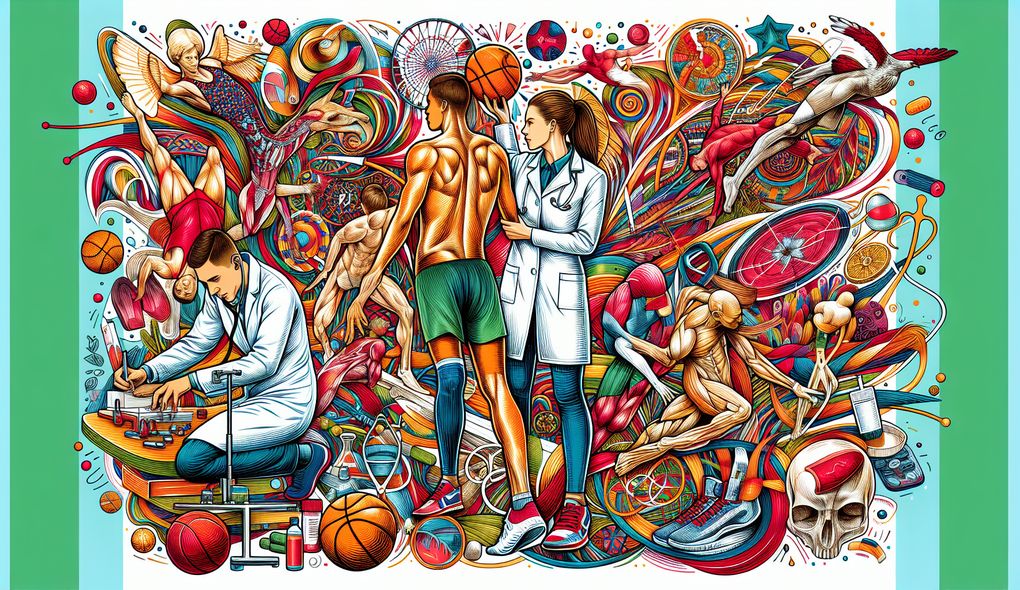What role do nutrition and diet play in an athlete's overall performance and recovery?
JUNIOR LEVEL

Sample answer to the question:
Nutrition and diet play a crucial role in an athlete's overall performance and recovery. Proper nutrition provides the necessary fuel for the body to perform at its best and aids in the recovery process after intense physical activity. Athletes require a well-balanced diet that includes carbohydrates, proteins, and fats to meet their energy needs and support muscle growth and repair. In addition, adequate hydration is essential for optimal performance and to prevent dehydration during exercise. Nutrition also plays a role in injury prevention, as certain nutrients, such as calcium and vitamin D, contribute to bone health. Overall, a well-planned and individualized diet can enhance an athlete's endurance, strength, and recovery ability.
Here is a more solid answer:
In the field of sports medicine, nutrition and diet are recognized as critical factors in optimizing an athlete's performance and facilitating recovery. Athletes require tailored nutrition plans to meet their unique energy and nutrient needs. Carbohydrates serve as the primary fuel source during exercise, supplying the energy necessary for optimal performance. Proteins play a key role in muscle repair and growth, while fats provide sustained energy and support hormone production. Additionally, hydration is vital to prevent dehydration and maintain optimal physiological function. As a sports medicine specialist, I would collaborate with registered dietitians and athletic trainers to assess athletes' nutritional needs, developing individualized plans to support their training goals and recovery. Utilizing cutting-edge technologies, such as wearable devices and apps, we could monitor and track athletes' dietary intake to ensure they are meeting their nutritional targets. Effective communication and collaboration with athletes, coaches, and other healthcare professionals would be crucial to facilitate adherence to the nutrition plans and address any concerns or challenges. By providing evidence-based nutrition education, we would empower athletes to make informed choices and maintain optimal performance throughout their careers.
Why is this a more solid answer?
The solid answer expands on the basic answer by providing more specific details and examples. It demonstrates knowledge of current sports medicine practices and technologies by mentioning the use of wearable devices and apps to monitor athletes' dietary intake. The answer also showcases the candidate's analytical and problem-solving skills by emphasizing the importance of tailored nutrition plans and individualized assessment. Additionally, it highlights the candidate's ability to work collaboratively in a team-oriented environment by mentioning collaboration with registered dietitians and athletic trainers. The answer could be further improved by providing more examples of effective communication and interpersonal skills.
An example of a exceptional answer:
In the realm of sports medicine, nutrition and diet are the cornerstones of an athlete's overall performance and recovery. As a sports medicine specialist, I would employ an interdisciplinary approach, integrating my knowledge of sports medicine practices and cutting-edge technologies to optimize athletes' nutrition and diet. Understanding the significance of nutrient timing, I would develop individualized plans that encompass pre-, during-, and post-performance nutrition strategies. For instance, pre-performance, athletes would benefit from consuming easily digestible carbohydrates to ensure adequate glycogen stores and mental focus. During performance, quick energy sources, such as sports drinks or gels, would be provided to sustain energy levels and enhance endurance. Post-performance, emphasis would be placed on replenishing and repairing muscle tissue through a combination of protein and carbohydrates. By staying current with advancements in sports medicine technologies, I would use wearable devices to track physiological responses and adjust nutrition plans accordingly. Furthermore, as a sports medicine specialist, I would prioritize effective communication and collaboration with athletes, coaches, and the multidisciplinary team. By conducting nutrition workshops, providing personalized feedback, and continuously educating athletes, we would foster an environment of trust, motivation, and optimal performance. Overall, I am passionate about the transformative impact that nutrition and diet can have on athletes' performance and recovery, and I am dedicated to integrating this knowledge into my role as a sports medicine specialist.
Why is this an exceptional answer?
The exceptional answer goes beyond the solid answer by incorporating additional details and examples. It demonstrates a comprehensive understanding of nutrition and diet in sports medicine by discussing nutrient timing and specific strategies for pre-, during-, and post-performance nutrition. The answer also emphasizes staying current with advancements in sports medicine technologies and utilizing wearable devices to track physiological responses. Additionally, it highlights the importance of effective communication and collaboration through nutrition workshops, personalized feedback, and continuous education. The exceptional answer showcases the candidate's passion for the topic and their dedication to integrating nutrition knowledge into their role as a sports medicine specialist.
How to prepare for this question:
- Familiarize yourself with current sports medicine practices and technologies by reading scientific research articles and attending conferences or webinars.
- Stay updated on the latest advancements in nutrition science and dietary guidelines for athletes.
- Develop a strong understanding of nutrient timing and its impact on athletic performance.
- Gain practical experience in developing individualized nutrition plans for athletes, considering their unique energy needs and performance goals.
- Enhance your communication and interpersonal skills by practicing active listening and empathy.
- Consider obtaining additional certifications or specialized training in sports nutrition to further enhance your expertise in this area.
What are interviewers evaluating with this question?
- Knowledge of current sports medicine practices and technologies
- Strong analytical and problem-solving skills
- Ability to work collaboratively in a team-oriented environment
- Excellent communication and interpersonal skills

